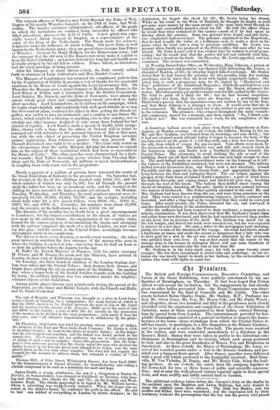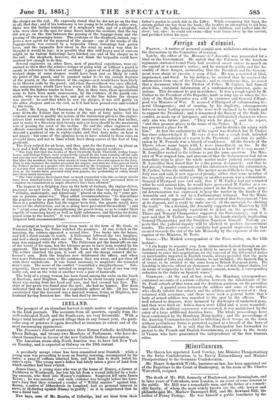'at Vroniurro.
The British and Foreign Commissioners, Executive Committee, and Jurors of the Great Exhibition, were publicly entertained by the au- thorities of Birmingham, on Thursday. It had been hoped that Prince Albert would accept the invitation' but the engagements he had already given to other bodies prevented him : the Royal Commission was there- fore represented by the Earl of Granville and Mr. Cubitt. The other guests included Baron Charles Dupin, Mr. Shelley, M.P., Professor An- sted, Mr. Owen Jones, Mr. Fox Mr. Henry Cole, and Mr. Digby Wyatt ; and altogether, about two hundred and fifty of the gentlemen moat closely identified with the origination and completion of the Great Exhibition of Industry, many of them accompanied by their ladies, entered Birming- ham by special train from London. The entertainment provided by hos- pitable Birmingham consisted of a general invitation to inspect the manu- factures of the town—those workshops from which the Crystal Palace it- self has issued ; to participate in a fete champetre at the Botanic Gardens; and to be present at a soiree in the Town-hall. The guests were received at the station, and were conducted immediately to a dejeffner in the Queen's Hotel : thence they were taken in parties to the industrial esta- blishments in Birmingham and its vicinity, which each group preferred to visit, and also to the great fonnderies of Messrs. Fox and Henderson at Smethwick. At three o'clock, the Mayor of Birmingham Mr. Lucy, re- ceived his reunited guests under a tent in the Botanic Gardens, and pre- sided over a banquet there spread. After dinner, speeches were delivered with a good will which answered to the hospitality received ; Earl Gran- ville, M. Von Viebahn, M. Dupin, and Mr. Henry Cole, being the lead- ing speakers. At six o'clock, the soiree drew the company together in the Town-hall for two or three hours of polite and scientific conversa- tion; and at nine the well-pleased visitors repaired again to their special train, and were swiftly and safely carried back to Londou,
The additional evidence taken before the Coroner's Jury on the deaths by the accident upon the Brighton and Lewes Railway, has only tended to make the original cause more obscure. The little boy %alms, and his mother and father, have been examined ; and the impression left by their testimony weakens the presumption that the boy was the person who place& the sleeper on the rail. He expressly stated that he did not go on the line at all, that day ; and if his testimony is too young to be relied on either way, there was the further testimony of a neigbour's wife, and of a shepherd, who were close to the spot for some hours before the accident, that the boy did not go on the line between the passing of the luggage-train and the passing of the passenger-train. The evidence of the shepherd, indeed, sug- gests a new agent for the removal of the sleeper : one of the trucks of the luggage-train was covered by a tarpaulin whose fastenings had gotten loose, and the tarpaulin flew about in the wind in such a way that he thought it would be lost; it is possible that this stiff heavy sort of canvass might in its violent fluttering,s have hitched one end of the sleeper on to the rail : the shepherd, however, did not think the tarpaulin could have reached low enough to do this.
Several engineers on other lines, men of practical experience, were ex- amined to show that the relative danger of going with or without a guard is equal, in reference to this sort of accident : a piece of wood of the particular wedged shape of some sleepers would have been just as likely to catch the point of the guard, and be jammed under it—to the certain fracture of the guard, or the overthrow of the engine—as it would have been likely to be thrown aside by the guard ; and when the overthrow was once effected, the consequences would have been worse with the heavier engine leading than with the lighter tender in front. But, in their turn, these speculations seem to have been made unnecessary, by the evidence of the parish con- stable, who was near to the spot, and got on the line before the sleeper was moved : he said that when he saw the sleeper, it was still partly on the other sleepers and on the rail, as if it had been passed over and crushed by the train. Lastly, Mr. Laing, the Chairman of the line, proved that he himself has gone down the Feltner line in trains at the rate of forty miles : but his evidence seemed to qualify the nature of the instruction given to the engine- drivers that twenty miles an hour is the maximum rate down that incline, and to make it a direction that twenty miles an hour should be the maximum rate of passing the crest of the incline. He and the other engineers and officials concurred in the statement that thirty miles is a moderate rate to descend a gradient of one in eighty-eight, and that forty miles an hour is not unsafe : but some of the opinions seem to have related to those rates on straight lines, and not to lines which have sharp curves at the foot of long gradients. The Jury retired for an hour, and then sent for the Coroner : in about an hour and a half they returned, with the following special verdict— "Time Jury find that the deaths of Mary Chatfield, Sarah Chatfield, Arthur Lang- horne, and George Chase, were respectively caused by the train running off the rails and passing over the Newmarket archway. That a broken sleeper was found on the line after the accident, but by what means it came there does not appear to the Jury. That in this instance the tender preceded the engine, and that the train passed down the Falmer incline at a greater rate than directed by the Company ; and the Jury are of opinion that such practices are dangerous, and that had the engine been placed first, or the tender been provided with iron guards, the probability of safety would have been much increased.
"The Jury express their regret that so much connected with this accident should have been removed before their inspection, by which they were prevented from so complete an examination as might otherwise have been afforded."
The inquest by a Brighton Jury on the body of Jackson, the engine-driver, produced no new facts. The Jury found a verdict that the sleeper had been "wilfully, maliciously, and feloniously" placed on the rails, by "some per- son or persons unknown." They added recommendations "to discontinue Ile practice as far as possible of running the tender before the engine as flicre a possibility that had the engine been first, the guards might have removed the obstruction, and in so doing have prevented the accident" ; and to "adopt some plan for strengthening the guard-irons, so as to render them capable of removing heavy as well as light substances, and likewise for fixing guard-irons to the tender." It was stated that the company had already an- ticipated both recommendations.
An attempt at burglary having been made at the farm of Mr. Cook, at Twinsted in Essex, the Police watched the premises. At one o'clock in the morning, the robbers appeared a second time. Two broke into the house, and left a third outside to watch. A Policeman followed the two burglars, and had a sharp contest with one of them. In the mean time, a labouring man was engaged with the other. The Policeman got the handcuffs on one of the wrists of his man, but the labourer seems to have been worsted by his opponent. The man's cries brought Mr. Cook to his aid with a loaded gun. The robber clutched the gun, it went off, and the charge entered the la- bourer's arm. Both the burglars now belaboured the officer, and when two more Policemen came to his assistance they ran away, and got clear off with their confederate. It was found necessary to amputate the wounded man's arm. The scene of the conflict "resembled a slaughterhouse." Sub- sequently, three men were arrested on suspicion: the head of one was very badly cut, and on the wrist of another were a pair of handcuffs.
The body of a young woman has been found among the rocks on the beach at Roedean, near Brighton. She appeared to be about twenty years of age ; blood was oozing from her head and ears, and had covered her face. The skirt of her gown was found near the spot; she had no bonnet. Her dress indicated that she had moved in a respectable sphere of life. [It has been ascertained that the deceased was a married woman, living at Brighten, her husband having forsaken her. She had died by drowning.]



























 Previous page
Previous page